Welcome to “The Price Is Right” — the fashion dealmaking edition.
Price is always central when it comes to putting millions or billions of dollars into a company or staging an IPO. Like the game show, there’s some guessing and gut instinct that goes into finding the right price for a deal. And there’s usually some wiggle room, a premium being paid to reap future opportunities or a discount to assume some risk.
But exactly what are the opportunities and what are the risks now that President Donald Trump is trying to reorder the global economy with an unprecedented trade war?
Did the business plan that seemed rock solid last week survive the latest tariff twist? (Trump delayed or reduced most of the new tariffs via social media on Wednesday, but the new levies on China were ratcheted up to 125 percent). How will the fashion supply chain adjust? And, now that everything’s changing, what new acquisition targets might pop up at an attractive price down the line?
There’s always some uncertainty in dealmaking, but that’s all just a little too much and so the wheel has stopped spinning — for now.
According to financial sources:
- Skims, which had been out looking to top off its latest fundraising round ahead of a potential initial public offering in the second half, hit pause on the fundraising. And the window that was seen opening for new offerings seems to be sliding back to 2026. (A company representative declined to comment).
- Prada faces a key decision on Thursday, the day its exclusive talks with Capri Holdings are set to end. That decision looks to be tougher than it might have been. Last week, the company was believed to be on its way to pay 1.5 billion euros for both Versace and Jimmy Choo. This week, it’s looking closer to 1 billion euros or even less for just Versace, although the process remains fluid. (Neither Capri nor Prada has acknowledged the process).
- Marquee Brands was in exclusive talks to buy Dockers from Levi Strauss & Co., but ultimately couldn’t get comfortable with the price in the tariff mayhem and had to let the opportunity slip. Now rival Authentic Brands Group is taking another look at the business. (Authentic declined comment).
- And payments giant Klarna was widely reported to have delayed its long-awaited IPO in the midst of the market’s tariff uncertainty.
Behind the scenes there was no doubt other dreams were dashed and processes disrupted.
As one person working in dealmaking said, “Everything is changing because the tariffs have affected every market on Earth.”
For now, the investors are largely sitting on the sidelines and keeping an eye out for when disruption flips over and becomes opportunity.
An informal and anonymous WWD poll of dealmakers at big private equity companies in the consumer space showed that even the experts are still reading the lay of the land.
“My guess is things are frozen until the real policy objective and new normal begin to come into focus,” said one investor, who said valuations could reset when the dust settles.
Whenever that is.
“Big question is: Is this a tactic [by Trump] that will secure short-term, small gains and then be abandoned or is this a genuine attempt to reset the U.S. trade balance? Today, it seems like the former — in which case, just another blip and short-lived fear. But if it’s the latter, it could be pretty bumpy for a while.”
Another said: “Deal velocity will slow. Uncertainty is a deal killer in multiple regards: market demand, margins, longer-term economic implications, cost and availability of leverage — pretty much everything. We are focused on long-term immutable drivers and trends. There will be opportunities in categories that become ‘oversold.’”
And a third said it’s going to be “really tough to transact right now if you don’t have to.”
“The companies that will be the most attractive will be those with a long history of sales and earnings that weathered COVID[-19] and the Great Financial Crisis as well and have some clarity on supply chain and tariffs. The strong will get stronger.
“This could be a field day for [Authentic Brands Group] and other brand licensing companies,” the dealmaker said. “They can be highly opportunistic and I don’t think anybody wants to be a public, branded business in this kind of volatile market.”
The sudden surge of tariffs and the scramble to negotiate or retaliate is a strange kind of crisis.
The other big problems of the last 25 years — including 9/11, the financial crisis and COVID-19 — didn’t have an easy off switch.
But Trump could turn down or ratchet up the pressure at will.
“It’s one person that’s making the decision on whether or not these tariffs stay in place and for how long,” said Charles Corpening, chief investment officer at West Lane Partners, a private equity company targeting middle-market consumer companies.
“The question really is what will compel him to change his mind?” Corpening said. “I don’t know, and I think there are very few who really know the answer to that question,” he said.
It’s Donald Trump’s economy. Everybody else is just trying to work in it.
The Bottom Line is a business analysis column written by Evan Clark, deputy managing editor, who has covered the fashion industry since 2000. It appears every other Thursday.


